Bob Crompton
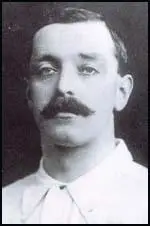
Robert (Bob) Crompton was born in Blackburn on 26th September 1879. He played local football for Blackburn Trinity before signing for Blackburn Rovers in 1896.
Crompton, who was only 17 years old at the time, joined the club at a time when it had an outstanding group of young players. This included Kelly Houlker, Tom Booth, Sam McClure, Tommy Briercliffe, Arnie Whittaker and Fred Blackburn.
Blackburn Rovers had experienced a great deal of success under Tom Mitchell, Blackburn's club secretary/manager. However, in October, 1896, Mitchell resigned. His replacement was Joseph Walmsley, a local cotton mill manager. It seemed Blackburn missed Mitchell as they slumped to 14th place in the First Division of the Football League in the 1896-97 season.
In the 1897-98 season Blackburn Rovers finished second from bottom. Only a decision to increase the size of the First Division of the Football League to 18 clubs saved Blackburn from relegation. The following season saw a revival with the team finishing in a respectable 6th place.
Blackburn found itself in another relegation struggle in the 1899-1900 season. The club had to win one of its last two games against Notts County and Preston North End in order to avoid the drop to the Second Division. Blackburn lost to Preston but managed to beat Notts County 2-0.
The Blackburn Times criticised the performance of the Blackburn team arguing: "There can be no such thing as standing still in the football world as in many other things, and as the Rovers have not made headway they must have been going backwards. Alas, this is only too plain. The rovers of today are not the Rovers of yore, when their fame spread far and wide".
The 1901-02 season saw a major improvement in the form of Blackburn Rovers. For a while it looked like they would win the First Division title. However, Sunderland beat them 1-0 at Ewood Park and this started a poor run that left them in fourth place by the end of the season.
Crompton had emerged as a superb talent. Despite only being 21 years old, he had become a commanding figure in the Blackburn defence and his leadership qualities resulted in him being appointed club captain.
In 1902 Crompton won his first international cap for England. Playing at right-back he held his place in the team for the next 12 years. At the age of 24 he was appointed as England's captain.
In July 1903, Robert Middleton, a former school teacher, was appointed as Blackburn's new secretary/manager. Middleton purchased Bob Evans, a Welsh international goalkeeper, from Wrexham for £150. In November, 1903, Middleton also persuaded Fred Pentland, who had scored five goals in eight games for Blackpool, to join the club. Pentland scored seven goals in 18 league appearances, but his efforts could not stop Blackburn from being involved in another relegation struggle. The club eventually finished in 15th place in the league.
It was the same story the following season. Despite good individual performances from Bob Crompton, Adam Bowman, Bob Evans, Fred Blackburn, and Arnie Whittaker, Blackburn could only finish in 13th place. In an article that appeared in the Blackburn Times a journalist wrote: "Like its two predecessors, the season of 1904-05 has been one of disgrace to the Rovers".
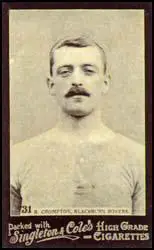
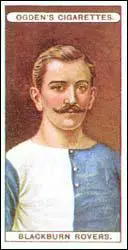
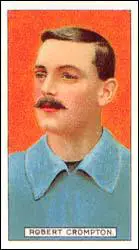
Lawrence Cotton, a local wealthy businessman, became chairman of Blackburn Rovers in March 1905. The following month Robert Middleton signed Welsh international striker, Billy Davies from Wrexham. Ellis Crompton, another young player with a reputation for scoring goals, also joined the club.
Blackburn Rovers finished in 9th place in the 1905-06 season. Adam Bowman was once again the club's top scorer with 15 goals. His strike partner, Billy Davies, added 11 more. Robert Middleton made several significant signings that year, including Jack Martin, Edwin Latheron, and Wattie Aitkenhead.
Blackburn Rovers finished in 12th place in the 1906-07 season. They were knocked out of the FA Cup by Tottenham Hotspur but won the Lancashire Cup when they beat Liverpool 3-0. Jack Martin proved to be a great buy and ended up the club's leading scorer with 17 goals.
1907-08 season was very disappointing. Blackburn Rovers was knocked out of the FA Cup in the first round when they were defeated by Second Division Leicester Fosse. They also had a first round exit in the Lancashire Cup. Blackburn's league form was little better and after a late rally they finished in 14th place.
Blackburn's new signings failed to shine. The Blackburn Times commented: "The second-rate players might advantageously be reduced and the money thus saved be utilized in paying the maximum wage to first-class men."
In 1908 Robert Middleton appointed the former Preston North End star, Bob Holmes, as trainer. This had a good impact on the team as they obtain 4th place in the 1908-09 season. Billy Davies scored 19 goals in 27 league appearances. This included four goals against both Bristol City and Everton. Ellis Crompton (10) and Edwin Latheron (9) added to the impressive number of goals scored that season. Blackburn, under the leadership of Bob Crompton, also won the Lancashire Cup and the East Lancashire Charity Cup that season.
Blackburn continued their good form the following season and by October 1909 they became leaders of the First Division of the Football League. They lost their position in January 1910 and finally finished in 3rd place behind Aston Villa and Liverpool. Blackburn's 45 points was the best total they had ever accumulated in a season.
Blackburn's defence was outstanding that season. In goal was England international Jimmy Ashcroft. Bob Crompton and Arthur Cowell were a formidable full-back pairing. George Chapman played at centre-half whereas Albert Walmsley and Billy Bradshaw were the wing-halfs.
An injury to Billy Davies caused the club serious problems in front of goal. Wattie Aitkenhead was top scorer with 14 goals and the consistent Edwin Latheron added 10 more.
Blackburn's away form in the 1910-11 season was disastrous with their only win coming on the last day of the season. Although they won 12 games at home they could only finish in mid-table. This was very disappointing considering their 3rd and 4th positions in the previous two seasons.
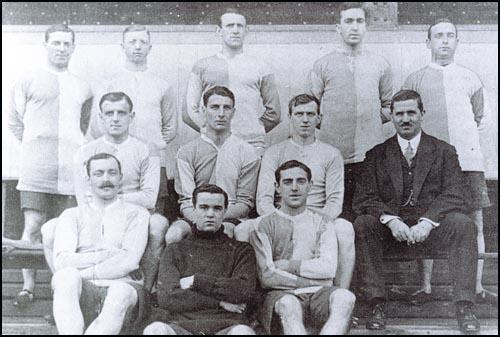
Edwin Latheron, George Chapman, Wattie Aitkenhead, Walter Anthony: Middle Row:
Albert Walmsley, Percy Smith, Billy Bradshaw, Robert Middleton, Front Row,
Bob Crompton, Alf Robinson and Arthur Cowell.
Jock Simpson joined Blackburn from Falkirk in 1911 for a fee of £1,800. The 1911-12 season began badly with Blackburn Rovers losing two of its first three games. Blackburn's form gradually improved and the team went on an unbeaten run that lasted three months. This took them to the top of the league. Despite being defeated by Bolton Wanderers and Arsenal, Blackburn went on another good run and by the end of the season they had three more points than main challengers, Everton. Bob Crompton, who had stay loyal to Blackburn, had helped the club win the Football League title for the first time in their history.
Blackburn started the 1912-13 season very well and were undefeated until December. This was followed by five successive defeats. In an attempt to regain the championship, Lawrence Cotton broke the British transfer record by buying Danny Shea from West Ham United for £2,000. He also purchased another forward, Joe Hodkinson for £1,000. Shea scored 12 goals but it was not enough and Blackburn finished 5th that season.
As well as buying the top players, Lawrence Cotton also invested in ground improvements. He spent 7,000 on a new stand by the River Darwen. This provided covered accommodation for some 12,000 spectators. In the 1913-14 season Blackburn once again won the league title. Danny Shea was in great form scoring 27 goals. Edwin Latheron also did well that season with 13 goals. Both men also won international caps for England that season. Patsy Gallagher, described Shea as "one of the greatest ball artists who has ever played for England... his manipulation of the ball was bewildering."
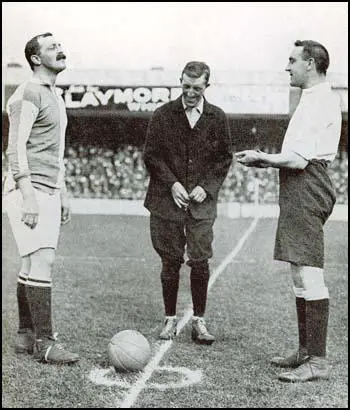
Charlie Buchan who played with Crompton for England in 1913. In his autobiography he claimed that "Crompton was undoubtedly the outstanding fullback of his time. A commanding personality, he was the best kicker of a ball I ever ran across."
Bob Crompton played his last game for England in 1914. All told, Compton had gained 41 caps, 22 of them as England captain. As one commentator has pointed out: "Bearing in mind there were only three regular international matches each year, then the odd tour in the summer, in modern terms this would have equated to something in the region of 120 caps. No wonder that in his time he was considered the greatest player in the world."
Crompton left Blackburn Rovers in 1919. In 23 years he scored 14 goals in 530 games. In 1921 Crompton was invited to become a director of the club. In 1926 he was appointed as manager. He began to build a team around star players, Henry Healless, Jack Roscamp and Syd Puddefoot.
This brought a change in the fortunes of the club and they did very well in the FA Cup in the 1927-28 season. Blackburn beat Newcastle United (4-1), Exeter City (3-1), Port Vale (2-1), Manchester United (2-0), Arsenal (1-0) to reach the final at Wembley. Puddefoot and Roscamp both scored four goals in the earlier rounds. Roscamp scored two more in Blackburn's 3-1 victory over Huddersfield Town.
Blackburn also did well in the First Division of the Football League: 1928-29 (7th), 1929-30 (6th) and 1930-31 (10th). Crompton retired as manager in 1931. However Blackburn Rovers struggled without Crompton and in the 1935-36 they were relegated. After two seasons in the Second Division, Crompton agreed to takeover again as manager. In his first season (1938-39) Blackburn won the Second Division championship.
The Football League was abandoned during the Second World War. The government imposed a fifty mile travelling limit and the Football League divided all the clubs into seven regional areas where games could take place. Blackburn Rovers became a member of the North West Regional League. However, Crompton continued to manage the club until suffering a hear-attack after watching Blackburn Rovers beat Burnley in a home match at Ewood Park on 15th March 1941. Bob Crompton died that evening.
Primary Sources
(1) Charlie Buchan, A Lifetime in Football (1955)
Crompton, who ended his career with the record number of thirty-four England caps, was undoubtedly the outstanding fullback of his time. A commanding personality, he was the best kicker of a ball I ever ran across.
